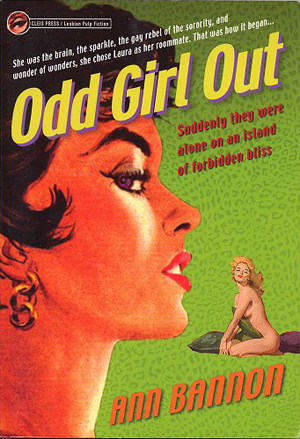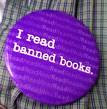 Somehow I have found myself reading two lesbian novels
written in the ‘50s one after the other. I had both Ann Bannon’s and Patricia
Highsmith’s books under my radar for quite some time, but only the news recently come to my attention that a movie based on Carol was coming out soon
prompted me to finally read it (or listen to it, rather). After Carol, I craved
more lesbian fiction and I turned to Ann Bannon. Both books being published in the same era, only few
years apart – Carol in 1952 and Odd Girl Out in 1957, they ask to be compared to
each other.
Somehow I have found myself reading two lesbian novels
written in the ‘50s one after the other. I had both Ann Bannon’s and Patricia
Highsmith’s books under my radar for quite some time, but only the news recently come to my attention that a movie based on Carol was coming out soon
prompted me to finally read it (or listen to it, rather). After Carol, I craved
more lesbian fiction and I turned to Ann Bannon. Both books being published in the same era, only few
years apart – Carol in 1952 and Odd Girl Out in 1957, they ask to be compared to
each other.

Now, I don’t know how strict the publishers were at
the time when they were asked by the Censorship to avoid any positive final
outcome of lesbian and gay relationships, but somehow Carol, or the Price of
Salt as it was originally named, managed to overcome those limitations and get
away with a relatively happy ending. It’s well known for that,
unfortunately. I say unfortunately
because I have the feeling I would have appreciated the ending more if I hadn’t
known that. As it happens, I did, and I wish it had been happier. But I had
little or no knowledge of how the lesbian fiction of the time was, so of course
I didn’t have any terms of comparison. Now I have read another one, Odd Girl
Out, and compared to it, it seems like a celebration of all things lesbians, of
EVERLASTING and TRUE LESBIAN LOVE. It’s even more surprising, knowing that it
was published five years earlier than Ann Bannon’s novel. Could it be that
its New York setting made it more permissive or more realistically open to
different kinds of love than the conservative microcosm of a Midwestern
University? Perhaps, but for whatever reason the two books are strikingly
different.
Carol is the story of Therese, a 19-year-old stage
designer who, at the beginning of the story, is working in a department store
for some extra cash at Christmas, and of Carol, a charming woman in her '30s, about to get a divorce. One day Carol comes to
Therese's desk to buy a doll for her daughter and Therese quite literally falls in
love with her at first sight. She sends her a Christmas card later and Carol
replies by inviting her out for coffee. They start an intimate friendship that later on becomes a love affair. There are complications
though, as Carol is going through a divorce and the husband is not ready to let
go of their daughter’s custody without a fight.
I enjoyed the writing in Carol. It’s quite beautiful
and perceptive. The story is as much about Therese’s complete entrancement with
Carol as about Therese’s struggle to find her place in life. To find meaning
and fulfilment.
I loved the age gap between the two women and I was
fascinated by Carol as much as Therese was. Their relationship isn’t one between
equals, though. Carol has way too much control over Therese and never seems to
reciprocate the younger woman’s feelings in equal measure. For a while it seems
Therese is merely a distraction, a way of taking her mind away from her bigger
problems in her life. She’s guarded and cold, always keeping Therese on the
edge, never fully letting her in and embracing their romance without
reservations. This was the only reason that kept me from falling in love with
the book completely. I wanted to see more passion from Carol. I know it was
there, she just never let herself show it. I understand her pain and fear of
losing her daughter were clouding her ability to show love to Therese, but it
made me weary of her, and I never fully trusted her. I didn’t trust her even if
I knew how it was going to end.
This said I am really excited that Cate Blanchett is
playing Carol. She seems perfect for the role and I couldn’t imagine anyone
else playing her.
After Carol, I was craving a true, passionate
lesbian romance and I turned to Ann Bannon. Ha! Little did I know.
At first, I thought the budding romance between young
and timid Laura and confident and charming Beth was really cute. I loved how
protective Beth was of Laura, how despite her teasing, she never means to hurt
her. This, however, proves to be her biggest mistake. I never fully warmed to
Laura, until the end, when she surprised me, by showing how much she has grown
and how much Beth had underestimated her. I found Laura throughout the book to
be annoying and spoiled and whiney. I liked Beth at first, I liked how sure of
herself and fearless she was. But as soon as she starts falling in love with a
guy, I started losing interest. This was supposed to be my steamy, forbidden,
lesbian story! What was happening? Alas, heteronormative was happening. Of
course, Beth hadn’t met the right guy yet. And of course, Charley was finally
that right guy. Who tells her that lesbian relationship can only happen during
childhood, that women should like men only, otherwise they are refusing to grow
up and to accept reality.
Thankfully Laura is having none of this shit. Even
though it takes a while for her to stop acting all confused and clueless about who
she is. I liked the ending, which is supposedly a bad one for their romance? Except it’s the best
ending that I could have asked for. I couldn’t wait for Laura to get rid of
Beth. It took her way too long. That ending gives me hope. And it’s the reason
why I will keep reading these books, and hopefully, finally, get my steamy,
forbidden, lesbian story.
Compared to Carol, there was a lot more talk about how
homosexuality is wrong and illegal and how it can stop a woman from growing up.
Surprisingly in Carol, Therese never questions herself about her love for
Carol. It just happens and she accepts it completely. She might have posed for
a moment to consider how society viewed her sexual inclinations, but she never
lets them affect her. The only time the issue is raised is by a man, who is
speaking out of hurt and disappointment. It’s never raised after that. It’s not
Carol and Therese’s concern to judge or hate themselves for what they’re doing,
which is beautiful. Of course, there are consequences to pay, because they are
still lesbians in the ‘50s, but I loved how self-hate or denial was never even
a thing for them.
In Odd Girl Out, the issue is raised again and again.
Mostly by men, but also by Beth, who does really think that lesbianism is a
thing to outgrow, and by her friend Emmy, who doesn’t even begin to comprehend
how a woman could find another woman attractive. ‘What’s there to want?’ she
says. But as much as she doesn’t understand it, she doesn’t judge it
either. The only one who isn’t affected
by this is Laura, and that’s her redeeming quality. Like Therese, she never
questions her feelings, never doubts them and never betrays them.
Which is something to admire in both of them.
I probably will never find the passionate,
Tipping-the-Velvet kind of romance I want from these books, but I will keep
reading them. I love the vintage setting, I love to read lesbian stories that
were genuinely written at that time, and I love to see how much they dared, and
how much they could get away with.
And hopefully Carol the movie will be as satisfying as
that trailer promises to be.
 Somehow I have found myself reading two lesbian novels
written in the ‘50s one after the other. I had both Ann Bannon’s and Patricia
Highsmith’s books under my radar for quite some time, but only the news recently come to my attention that a movie based on Carol was coming out soon
prompted me to finally read it (or listen to it, rather). After Carol, I craved
more lesbian fiction and I turned to Ann Bannon. Both books being published in the same era, only few
years apart – Carol in 1952 and Odd Girl Out in 1957, they ask to be compared to
each other.
Somehow I have found myself reading two lesbian novels
written in the ‘50s one after the other. I had both Ann Bannon’s and Patricia
Highsmith’s books under my radar for quite some time, but only the news recently come to my attention that a movie based on Carol was coming out soon
prompted me to finally read it (or listen to it, rather). After Carol, I craved
more lesbian fiction and I turned to Ann Bannon. Both books being published in the same era, only few
years apart – Carol in 1952 and Odd Girl Out in 1957, they ask to be compared to
each other.




















